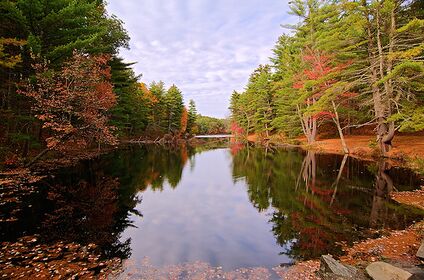Sustainability initiatives
CampaignsInitiatives by topicBiodiversityWikipedia: Massachusetts, Ecology Climate action350 Massachusetts - Greenovate Boston, community-driven movement to get Bostonians involved in reducing the city’s greenhouse gas emissions 25% by 2020 and 80% by 2050 wikipedia:Climate change in Massachusetts Community energyBrewster Community Solar Garden - Resonant Energy, Dorchester, Boston Wikipedia: Solar power in Massachusetts, Wind power in Massachusetts Community involvementDudley Street Neighborhood InitiativeDudley Street Neighborhood Initiative, nonprofit, community-run organization based in Roxbury, Massachusetts. It was founded in 1984 by residents of the Dudley Street Neighborhood, along with members of the Riley Foundation, as an effort to rebuild the poverty-stricken community surrounding Dudley Square. It is known as the first community-run grassroots organization to gain "the power of eminent domain" by the Boston Redevelopment Authority, meaning the community controls its own development and the use of the land. W Via the Dudley Street Neighborhood Initiative, residents worked with city and state officials to transfer ownership of 15 acres to a Community land trust (CLT), in which 1,300 parcels of land were placed. Now, those lots boast 225 new affordable homes, a 10,000-square-foot greenhouse, urban farm, playground, gardens, and other amenities one would only expect in more privileged, resource-rich neighborhoods. [1] Cycling activismError in widget YouTube: Unable to load template 'wiki:YouTube'
Hubway bike sharing system for Metro-Boston Education for sustainabilitywikipedia:List of nature centers in Massachusetts Environment qualityMystic River Watershed association - wikipedia:Pollution on Cape Cod Food activismLeague of Urban CannersPlanting an urban fruit tree is more than a lifetime commitment — it is an intergenerational civic responsibility. Each summer, in Greater Boston, a huge amount of backyard fruit falls to the ground and sidewalk, where it rots and creates a mess. Property owners and municipalities are often pressured to remove these "nuisances," while many urban residents are struggling to access local and organic food sources. The League of Urban Canners has developed a network of individuals to map, harvest, preserve, and share this otherwise wasted fruit. They make agreements with property owners to share the work of fruit harvesting and preserving, as well as tree and arbor pruning. The preserved fruits are shared between property owners (10 percent), preservers (70 percent), and harvesters (20 percent). Each season the completely volunteer-run enterprise harvests and preserves about 5,000 pounds of fruit from a database of more than 300 trees and arbors. Myriad acts of cooperation sustain this urban commons, in which harvesters, property owners, preservers, and eaters learn to share responsibility, resources, and care for each other and their urban environment. —Oona Morrow [2] Other linksHigher Ground Farm, Boston’s first rooftop farm, facebook page Open spacesDepartment of Conservation and Recreation (mass.gov) - Greater Worcester Land Trust - Kestrel Land Trust - Mount Grace Land Conservation Trust - Mystic River Reservation - Sudbury Valley Trustees SharingReading Public Library’s Library of Things Sustainable transport activismWith nearly a third of Bostonians using public transit for their commute to work, Boston has the fifth-highest rate of public transit usage in the country. Nicknamed "The Walking City", Boston hosts more pedestrian commuters than do other comparably populated cities. Owing to factors such as the compactness of the city and large student population, 13% of the population commutes by foot, making it the highest percentage of pedestrian commuters in the country out of the major American cities. As of 2013, Walk Score ranks Boston as the third most walkable US city. [3] Wikipedia: Hiking trails in Massachusetts (category) Towards sustainable economiesWellspring Cooperative, "creating an engine for new, community-based, worker-owned companies in inner-city Springfield, based on the purchasing power of area anchor institutions." |
News and comment2017 Check Out This Seed Library in Boston and Learn How to Start Your Own, Nov 27 [4] Boston outlines its plans to adapt to rising sea levels, Oct 30 [5] This Massachusetts Town Shows What a Sustainable Economy Looks Like, Jul 12 [6] Church solar project inspires solar for neighborhood, May 2 [7] 2016 Boston Resilience Blueprint Leads With Discussions of Race, Equity, Nov 21 [8] Teenagers force Massachusetts to act on greenhouse gases via lawsuit, May 19 [9] 2015 How One Boston Neighborhood Stopped Gentrification in Its Tracks, January 28 [10] 2014 How Boston is rethinking its relationship with the sea, October 27 [11] Massachusetts to open area the size of Rhode Island to offshore wind power, June 18 [12] A Worker Cooperative That Proves Alternative Economic Systems Aren’t Only For The Privileged, Apr 14 [13] Boston Doctors Can Now Prescribe You a Bike, April 9 [14] ResourcesCitizens data initiativeEnergy Profile for Massachusetts- Economic, environmental, and energy data CommonsSenior Village Movement, Boston The first senior village began in Boston's Beacon Hill neighborhood in 2001 when about a dozen elders wanted to avoid going to a nursing home. They founded a nonprofit to co-purchase the services retirement communities provide, but get them where they already live. They became the first "virtual retirement community" offering services such as transportation, food delivery, home repairs, dog walking, and social activities. After four years of successful operation, The New York Times published a feature story about Beacon Hill Village. The idea began to spread. To support those who were interested in following their example, Beacon Hill Village published a how to manual and began helping other elders set up villages. Eventually, the Village to Village Network was formed to launch these villages. Today there are over 200 villages around the world with more than 150 forming. Rita Kostiuk, national coordinator of the Village to Village Network, says: "People are excited and want to move to where villages are, I think villages benefit the whole person; mind, body and soul. As we educate the federal government on how well it’s working, we’ll start seeing even more." [15] Community resourcesInterwiki linksWikipedia: Massachusetts
|
